Archive for June, 2023
Unexpected chance in Slovenia
- Architecture M.Sc.
- Slovenia, Ljubljana
- Arhitektura Krušec
- 10/2022 – 03/2023
Living in Ljubljana
My internship in Slovenia happened by pure, lucky coincidence. During my last internship in Sevilla in the spring of 2022 I met some Slovene people, among them a university professor for architecture of the university in Ljubljana. I told him that I still needed some more months of internship and he suggested to apply at his office. Since until that point I did not know anything about Slovenia and I really liked the people I met, I decided to take that chance and applied.
I arrived to Ljubljana in the end of September 2022 and had one week to explore the city before the work started. In this week I had the great luck to meet some Erasmus students that came to study for a semester in Ljubljana. Through them I continued to meet new international people during my whole stay, which was truly amazing!
I lived in an apartment right in the city centre, two minutes walking from the Prešeren square. It was in a beautiful old building that I shared with five other students among them also some Slovene students that also became really goof friends of mine. Apparently, I was lucky to find a room that I didn’t have to share because after my arrival I found out that it is a very common concept in Slovenia for students to share rooms. Because of its great location we would often have gatherings at my place.
In the architecture office I had eight colleagues plus the bosses (plus the office dog, an amazing Border Collie). The atmosphere in the office was really good, like they are all friends, and half of my colleagues were more or less my age, which was also very nice for me. They tried to speak a lot of English to include me but to each other they obviously would speak Slovene, which I – surprise – did not understand at all. You do not really need to speak Slovene to live here because most people speak English perfectly, but I wanted to learn at least the basics. For a reason that I don’t know there is a lot of videos on YouTube about Slovene Grammar. If you want to learn this language and have no experiences with Balkan languages, I recommend watching those. Another thing that really helped was getting a book, that I know very well in German, in Slovene. That made it much easier because I didn’t have to look up every word. After the six months of internship, I am still very far away from being fluent in Slovene, but I can read a lot and understand more basic conversations. If you come here, I definitely recommend giving it a try.
The work in the office was diverse. They gave me a lot of different tasks, which I am very grateful for. I was participating in the design phase for new projects, make models, draw execution plans, edit renderings,… I learned a lot of things that I will be able to apply in the upcoming years of my studies.
Apart from the work I had a great time in Ljubljana. Slovenia is very small but has a very diverse and beautiful nature. You can do a different trip every weekend and not run out of nice places to visit. And since Ljubljana is located basically in the centre of the country, all the destinations are reachable in like two hours by car. Very fascinating are for example the Soča Valley, Zelenci Lake, Velika Planina, Bohinj and the Vintgar Gorge. The nature is so abundant and I recommend exploring it even if it is just for a vacation!
Ljubljana is the biggest city in Slovenia and has a population of roughly 280.000 people, which means, considering it is the capitol, it is very cosy. But it is not only the comfortable size that makes it cosy. The centre consists of old but mainly well-preserved buildings, everything is clean and green. Also, the centre is free of cars which is amazing for pedestrians. There are always people on the streets, even in winter people would sit outside of the cafes and restaurants to drink their kuhano vino, mulled wine, next to the fire.
The original plan was to do an internship of three and a half months. But I soon decided to extend it and stay in the office six months. Even after finishing the internship, I will stay six weeks longer now to explore more of this country, enjoy the city and see the spring.
I will keep taking unexpected chances like this one – they might hold something great.
Falling in love with Vienna
- Architecture M.Sc.
- Austria, Vienna
- AllesWirdGut Architektur ZT GmbH
- 09/2022 – 02/2023
In September 2022 I started my 6-month long internship at AllesWirdGut Architekten in Vienna, Austria. As Austria’s capital and its largest city Vienna offers a multitude of diverse activities. Its stunning historic architecture and impressive offer of culture and art made the city so appealing to me.
Before I moved to Vienna, I researched different architecture offices in the city. Finding the right office for me was at first a bit overwhelming, as it was my first experience
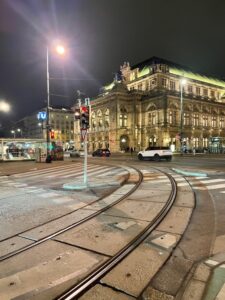
© Pauline Linka
working in an actual office and I wanted to gain insight into various parts of the office life. Furthermore, I wanted to be able to identify with the office’s style. When searching for offices to apply to, I recommend checking out their social media presence. Most offices have an Instagram page, which not only shows their projects but often also gives an insight into the daily work environment and the general atmosphere.
After finding an internship, I started looking for a room to rent on WG-Gesucht. From my friends I know that finding a room can take some time but I found that after investing some time in writing an informative message about yourself and taking part in a few WG-Castings I was able to find a nice room in a great location quite easily. I found a room in the 3rd district, close to the Belvedere and with a great public transport connection to my office. Compared to ot
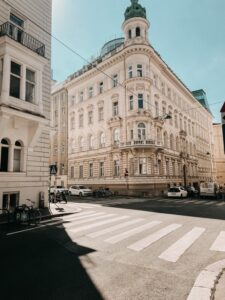
© Pauline Linka
her large cities rent in Vienna is quite low and there are many beautiful his toric apartments available for rent. However, I recommend looking for an apartment with roommates, as single apartments tend to be more expensive and as an added bonus, living in a shared apartment is a great way to make friends when moving to a new city. There are also many possibilities to rent an already furnished room as I did. That definitely made moving much easier. Another important factor when looking for an apartment is the location. In general Vienna’s public transport system is very reliable and well connected, which makes it possible to also move to the outer districts. Nonetheless I would recommend looking for places with in the first 9 districts, they all offer different cultural sights and are very lively and well connected. The 10th district is known to be unsafe and not the most desired living area however over all Vienna is a very safe city and as a woman I never once felt unsafe, even when walking home alone at night.
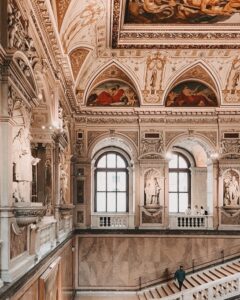
© Pauline Linka
After finding a place to live, there are a few more things that need to be taken care of. The first thing after moving into the new apartment should be a visit to the closest municipal district office to register the new address. My health insurance was covered by my employer and all I had to do was to apply for my Austrian E-Card with my Austrian social security number, however even without an E-Card there are no problems when going to the doctor, they also accepted my German insurance card.
I arrived in Vienna a few to days before my internship started, to get settled and to explore the city. Besides seeing all the major sights, I really enjoyed just walking around and exploring the city away from crowds. Another great way to see Vienna’s sights is taking the tram or Bim as it is called by the locals, the lines 1, 2 and 71 drive by the opera, the city hall, the parliament, the Volksgarten and the Hofburg. While the 1st district is often overcrowded by tourist
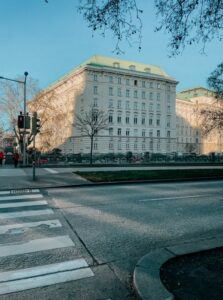
© Pauline Linka
s, checking out the Stephansdom and the Hofburg are mandatory. Besides that there are many famous cafes, bars and restaurants located here. The best Schnitzel is served by Figlmüller, which has three locations in the 1st district. It’s usually booked weeks in advance and a reservation is recommended. In general but especially on the weekend reservations are mandatory to explore Vienna’s diverse cuisine, not only restaurants but also bars, are usually booked fully from Thursday to Sunday. I also recommend trying a piece of Sachertorte or some traditional Kaiserschmarrn at Café Demel, one of the oldest Coffeehouses and bakeries in Vienna. Personally, I prefer the Sachertorte at Café Demel over the one at Café Sacher, but there are entire guides about finding the best Sachertorte in the city. It’s a thing. Also ordering a “coffee” in a Viennese Coffeehouse will get you a concerned look from the waiter and a lecture on coffee, so I recommend ordering a mélange, the viennese version of a cappuccino. However the fact that Vienna besides being voted the most livable city repeatedly is also supposedly the unfriendliest city, cannot be confirmed. Unless you count the waiters in a traditional coffeehouse.
I experienced the people in Vienna as very open and welcoming. I found it was quite easy to make new friends, however I was also very lucky, as there were quite a few interns at the office I worked at, which made it easy to connect with new people.
In general, I had a great experience in Vienna. I really enjoyed working in an architecture office and learned a lot. During the last 6 months a made amazing new friends and fell in love with the city a bit more everyday. Even though I used every free minute after work or on the weekends to see more of the city, there is still so much left to explore. That and the fact that I instantly felt at home in Vienna led to my decision to stay and finish my Master in Architecture at the TU Vienna.
Internship in the Republic of Northmacedonia
- Practical Year in Medicine
- Republic of Northmacedonia, Skopje
- University Clinic for Dermatovenerology
- 01/2023 – 03/2023
My experiences:
Preparation: To organize this internship was fairly easy. The person responsible at the university is very responsive and very organized. Within two days, I had the acceptance from the department of dermatology. Once you are accepted, start preparing for the visa. It’s nearly impossible to reach the embassy in Berlin via phone and I recommend to prepare all documents and then go there directly. They will then tell you if something is missing. Just a hint here: The criminal record needs to have an apostille and you will need to translate all documents into Macedonian. If you translate it from English, you can reach out to official translators in Macedonia. They are very reliable and work quickly.
To bring: You should bring scrubs, a coat and a stethoscope, etc. As a nice gesture, do not forget to bring some souvenirs from your city.
Language: I was amazed by the advanced level of English the general population has. As they do not dub their movies, nearly everybody understands English and speaks it. However, I recommend making an effort to learn Macedonian. A great book to learn it is ‘Macedonian: A Course for Beginning and Intermediate Students’ by Christina E. Kramer and Liljana Mitkovska.
Health: While technically the European insurance card is valid, I recommend getting a private health insurance. Prices for consultancies are affordable and you will not wait longer than a few days to see a specialist. I went to the dentist here and I got an appointment within one day. The quality of care in the private sector is very good.
Safety: Macedonia and Skopje are very safe. Even when walking through the city at night alone, I never felt unsafe.
Money: In most places you can pay cash or by card. It’s good to always have some additional cash with you as some places – especially in the rural areas – do not accept card payment. If you have an apobank credit card, use the atms from Hallbank. They do not charge any fee.
Shopping: The cost of food in the supermarkets is comparable to Germany. However, going out to eat is considerably cheaper and activities such as going to the ballet/opera cost around 5€.
Transportation: Skopje has very cute double decker busses which are well connected. However, as I lived close to the hospital, I walked there. As the city center is quite small, most of the major sights and places are in walking distance. If you plan to travel within Macedonia, check out the bus companies at the bus station. At very reasonable prices you can go nearly everywhere. Biserprom is a bus company that offers weekend or single day travels. Check out their Facebook page. I went to Mavrovo (a great ski resort) and back for 5€.
Communication: As Northern Macedonia is not part of the EU-roaming packages, you will need to buy a separate SIM card. I recommend choosing A1, which has monthly packages for 300MKD (approx. 5€) 20GB. The internet connection with the mobile phone is super stable and coverage is great. Even when hiking, I never lost network.
Accommodation: To find a flat, have a look at AirBnB, Facebook (group: Skopje expats) and reklama5. In general, prices for a flat should be around 200-300€ – you can of course find cheaper rooms in the outskirts. I lived in Kisela Voda, which was a great and quiet neighbourhood.
Travel and arrival: There are numerous air- and buslines that go to Skopje. I travelled with bus (32h drive) for approximately 100€. While they do take breaks every 1-2hours, it is not the most comfortable way to travel. If you decide to go by plane, you can take a taxi or a bus which runs every 3-4h to the city.
Work routine: The mornings start with a short round of patient visits and then a morning meeting with all staff at 08:00. Afterwards, you continue to see the patients together with the specialists. On Wednesdays, all staff does a round together to see all patients. After the morning round, you can choose which specialist you want to join. Most doctors are happy to explain everything to you while they treat the patients, which is very helpful to understand the conditions of each patient.
Free time: Skopje is a great place to be in the nature and hike. In walking distance from Skopje center, there is Vodno mountain which offers a great view of the city. Near Skopje, there is the Matka canyon which features underwater caves whose depths haven’t yet been explored fully. The Vrelo cave is with its explored 240m already one of the deepest caves in Europe and the world. Another place worth an excursion is Ohrid, a beautiful city three hours south of Skopje. It is bordering the lake Ohrid, one of the oldest lakes in the world. In Ohrid, there were 365 churches/chapels – one for each day of the year. While not all still exist, there is a significant amount of them one can explore. If you are less into nature, have a look at the numerous great coffee bars Skopje offers. At nearly any time, you can see people chatting and drinking coffee there. The old bazar is also a must see.
My stay in the modern town of Delft
- Robotic Systems Engineering, M.Sc.
- Netherlands, Delft
- Delft University of Technology
- 08/2022 – 02/2023
I am a master student from RWTH Aachen, Germany. My first impression of Delft was that it is a very clean and modern town, which is reflected in the clean and tidy train station. The greeting drivers on the bus, the friendly waiters in the restaurants and the passers-by who welcomed me to Delft all proved the warmth of the people there.
Culture shock
The biggest culture shock was the heavy use of bicycles. In Aachen, bicycles are not the most dominant mode of transportation, probably because the city is not very big and some of the roads are not smooth. But Delft has a surprisingly large number of bicycles, and it certainly is the most dominant form of transportation in Delft. There are two-way bike lanes on both sides of Delft’s roads, which provides a huge convenience for cycling. Therefore, if you are coming to the Netherlands for an internship, my most recommended mode of transportation is by bike. Another culture shock is the book bags hanging in front of many houses. I didn’t know much about this phenomenon at first, but after asking friends and checking the internet I realized that hanging school bags is how Dutch students celebrate graduation. Another interesting phenomenon is the way people relax
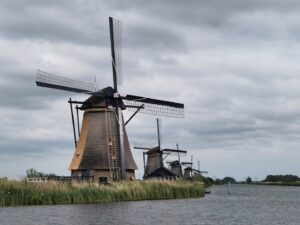
© Disen Wang
on weekends, which is boating. This is a phenomenon that can only be seen in parks in China and Germany. Probably because there are many rivers in Delft, I found that many families have their own boats and have the habit of boating, which I think is a very interesting way to have fun. The most comfortable thing for me is the widely use of English and the cashless shopping, which is not available in Germany. The English language is so widespread in the Netherlands that you can live in the country without any problems even if you don’t speak Dutch. I don’t need to carry a lot of cash every day because of the wide use of cards payment. One thing I don’t quite understand is that when it comes to cash transactions, the smallest unit is 5 cent, and they won’t give back any change less than 5 cent. I hope you won’t stand at the counter like me and wait for them to find the money.
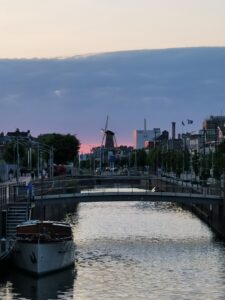
© Disen Wang
Health insurance
As an international student with German insurance, it is not difficult to visit a doctor in the Netherlands and you do not need to apply for new insurance. You can use your German insurance to visit a doctor in the Netherlands, but the process is a bit different than in Germany. The German insurance card cannot be used directly in the Netherlands, so you need to pay for your own medical expenses first and then fill in the reimbursement information on the German insurance company’s website. I went to the dentist in Delft, and I was able to get reimbursed by my German insurance company for both the doctor’s visit and the medication. However, not all medications are reimbursed, and some may not be covered by insurance. My total cost was 97.11 Euros and was finally reimbursed 92.11 Euros, and the result of the review was issued within a week, which was acceptable to me. Of course, I still hope you won‘t get sick!
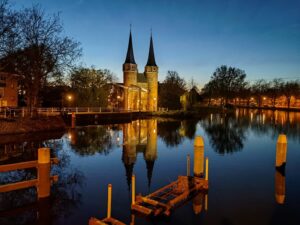
© Disen Wang
Travelling
First of all I would like to start with a few words about train rides. Unlike Germany, you need to go through ticket machines to enter and exit the stations in the Netherlands. In addition, the ticket prices in the Netherlands are fixed and do not change with the date of purchase like in Germany, which is very friendly for people who do not like to plan their trips in advance. I also highly recommend getting an OV chip card, which can be used for most trains and buses in the Netherlands, so you only need to swipe it when you get in and out of the station, no need to buy tickets online. Rotterdam is a very modern and clean city with a lot of skyscrapers, which is not like a typical European city. The Kinderdijk, located near Rotterdam, is one of the most impressive tourist attractions for me. The beach in Den Haag is very beautiful and I like it best in the evening, when the crimson sunset shines on the beautiful clouds and the beach, and you can see some boats and windmills in the distance. Amsterdam is also a city I really like, it is more historitic compared with Den Haag and Rotterman. The Royal Palace of Amsterdam is gorgeous. The Van Gogh Museum and the Dutch National Museum are also well worth a visit. Another point worth mentioning is
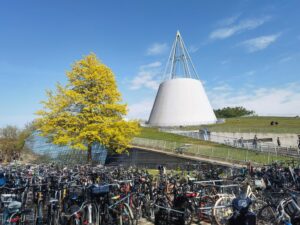
© Disen Wang
that most of the attractions in the Netherlands have audio guides in several languages, including but not limited to English, Chinese, Dutch, French and German, which is really friendly to foreign visitors. The following pictures were taken by myself. The first three are in Delft and the last one is in Kinderdijk.
All in all, I really enjoyed my visit to the Netherlands. If you also like to explore different cultures, please don’t hesitate to come to the Netherlands, you will never regret it.
Incredible experiences in Paris
- Computational Engineering Science B.Sc.
- France, Paris
- Wiremind
- 10/2022 – 03/2023
Application/ finding an internship
Since I went to Paris in august 2021 for two exchange semesters at a university, I decided that I’d like to stay longer. The resulting conclusion for me was therefore to search an internship in Paris. I’m currently enrolled in a Bachelor of Computational Engineering Science. For this cursus it is mandatory to make an internship that lasts at least three months at the end of our studies.
Luckily, I already collected some recommendations for the application process in France during my time at the university over there. I sent two applications to start ups in Paris. The application process for the two positions included first an online test and afterwards a personal meeting where I introduced myself and presented what I’ve coded in the exercises before.
To search for open job positions I can highly recommend having a look at welcometothejungle.com. This platform is used by startups as well as larger, classical companies (e.g., L’Oréal). The company where I made an internship as “Junior Full Stack Software Engineering Intern” is called wiremind. They offer optimization solutions in the context of transportation.
Concerning the language, I can highly recommend having already basic knowledge in French before the internship. During my internship I met some people who are not speaking French neither are willing to learn it. Not speaking French is in general not a real problem in the background of business questions, but it is difficult to integrate in the French culture and find friends (that are French) if you don’t know their language. Besides of this, no French person is going to judge if you try to speak French, but you are not yet fluent. I met a lot of people who had German in school and they where always impressed by French, because they compare it to their knowledge of German.
Accomodation and living expanses
Paris is a very expansive city. During my internship I earned 1500€ of salary (brut). It is common in France that the employer pays the half of the transportation per month. Another particularity of working in France is that they hand out restaurant checks to the employees. In general, the company pay for 20 days 5€ per day and they subtract directly 5€ from the employee’s salary and add it to those restaurant checks (around 160€).
The cost for an appartement varies between 750€ and 1300€ for small appartements. It highly depends on the location of the appartement. As an example, I’m living with my boyfriend in a 32 square meters appartement with two rooms that is fully equipped, and we pay around 1500€ in the “quartier latin” near to the Pantheon. I met many people who are living outside of Paris in the banlieu to save some money.
I would all the costs are higher in Paris especially in comparison to Aachen. Thanks to the inflation in Germany, it feels like the difference for food prices in comparison between France and Germany is decreased, but this could as well be just a feeling.
Everyday life / the internship
During my internship of six months, I got six days of vacation. Personally, I really appreciate the working hours in Paris. Normally I’ve started around 9:30 am and worked until 6:15 pm. In the lunch break we were making some sport or playing FIFA or Mario Kart. According to my contract I’ve worked around 35 hours, which is the legal limit in France.
Free time / tips
Paris is a city which is not only incredibly beautiful but also busy city. If you are under 26 the most of the museums are free. I’ve started during my internship to go running with my colleagues in the lunch break. After 5 months I made a half marathon together with one of them. There exists an entire running culture in Paris. During the week at around 12 am there are many runners at the quay of the Seine (which is stunning with sunshine). Another advantage of living in Paris is the fact that from Paris you can reach nearly every important city in France by train without switching the train. Staying for some time in Paris gives you the opportunity to discover France.
Conclusion
I would do it the same way again and again! My internship was incredible in terms of my tasks and my colleagues. I really appreciate every second I could spend at wiremind!
As I mentioned before, I highly recommend to already speak French or at least being willing to learn and speak it. Especially if it comes to jobs where you need to interact with customers it is necessary to speak French. Furthermore, I recommend Paris as city for an internship. Since I’ve already done an Erasmus exchange at a university in Paris and an internship in Paris, I tend to recommend the internship. In my opinion Paris itself is not a student town. It’s too large and honestly just too expansive if you have no income like a salary due to an internship.
Great internship in an architecture office
- Architecture M.Sc.
- Netherlands, Rotterdam
- studio AAAN
- 11/2022 – 04/2023
Application/Finding an internship
I did my internship with Erasmus+ in the Netherlands in Rotterdam. There I spent 5 months working in an architecture office.
Finding a spot for an internship was definitely time-consuming and at times a bit frustrating. Many offices didn’t respond to my application at all. For me it helped to not only focus on the well-known offices, but to look for smaller ones as well. When one of these offices invited me to do an interview online, I was delighted. It went quite well and they offered me the position right away.
Accomodation & Living expenses
From that point on everything happened very quickly and there was still lots to do.
For example, finding a place to stay. In Rotterdam that turned out to be quite the task. Many people are looking for accommodation in the city, so finding something can be a challenge. I found my place via kamernet.nl, where I got a subscription and messaged as many people as I could every day. You definitely need to be quick, but it’s possible. In the end I scored a room in a shared student house in Rotterdam West. I was really lucky to have great flatmates and I absolutely loved living in West. It’s a really nice area close to the centre where a lot is happening, so I can only recommend checking it out.
Living in Rotterdam can be rather expensive. Rent was quite a bit more than in Aachen, where I study. Also groceries, restaurants, museums and other activities can really add up. While that’s something to be aware of, with my internship salary, the Erasmus+ scholarship and subletting my room in Aachen, it all worked out.
Everyday life/ the internship
The internship was great. It was a small and young team and everyone was super friendly. I felt very welcome from the beginning and genuinely enjoyed going to the office. In my experience Dutch people are very open and their English is fantastic, so it was easy to connect with them. They also seem rather laid-back but are still upfront and share their honest opinion. I really enjoyed that mentality. My bosses taught me a lot about architecture in general and in the Netherlands and my colleagues soon became good friends. After work we would often grab something for dinner or go to the local wine bar. Once a week some of us also went bouldering together.
Free time/tips
On the weekends I would meet friends and explore Rotterdam and the surrounding area. My favourite part about the city are the endless possibilities of activities. There are many great museums and art galleries for example. I would highly recommend getting the Museum card or the Rotterdam pass if you’re interested in that. I didn’t get it and I think I could have saved a lot of money.
I also fell in love with the many markets. Pop-up graphic design markets, vintage kilo sales, the food and clothes market in front of Markthall, the market at Noorplein – there is lots to discover. It’s definitely helpful to follow some websites or Instagram pages and keep an eye out for flyers and posters to find out about the next vernissage, crocheting workshop or forest light installation.
What I will also miss is the huge range of snack bars and restaurants. There are so many different cultures and culinary directions to choose from, it’s amazing.
In addition just biking across the city and looking at the architecture was a highlight for me (if it didn’t rain). Having a bike is definitely a must. I rented a Swapfiets and was very happy with it.
Rotterdam’s nightlife also didn’t disappoint. There are plenty of bars and some great clubs.
If you are interested in daytrips, the Hague, Amsterdam, Utrecht and the sea are all only a short train ride away and there is so much to see!
Conclusion
In conclusion I highly recommend doing your internship in Rotterdam. The city is very interesting and diverse. I met lots of great people and made many valuable memories with lovely friends.
Internship at Bosch in Austria
- Mechanical Engineering B.Sc.
- Austria, Hallein
- Robert Bosch AG
- 10/2022 – 03/2023
After postponing my mandatory internship for as long as I could due to the covid pandemic, as I wanted to do it abroad, I finally decided to do it during the winter semester of 2022. Since it was during winter, and I really like skiing, I decided to search for internships in Austria and Switzerland. This is where things started to get a little complica
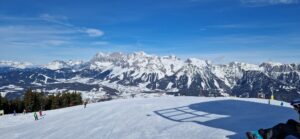
© Ralph Rauhut
ted: The mandatory internship for the Mechanical Engineering B.Sc. degree has to cover very specific topics to be accepted as such. Only few companies have the capacity to offer all the tasks that are needed to acquire the requested experience.
I searched all over the internet for internship openings that met the needed criteria. As there were only few openings, I knew that I had to polish my application documents to even have a chance of getting the internship. I asked help from friends to improve my CV and motivation letter, and gathered letters of recommendation from my previous bosses. After a couple of negative responses, I finally got invited by Bosch in Hallein to two online interviews (for a total of four internship openings). Each interview was held by a manager from the respective area, and someone from HR. The interviews were very relaxed and felt more like a normal conversation with friends, where we talked about my background,
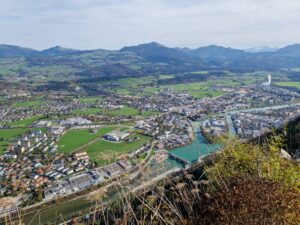
© Ralph Rauhut
my goals for the internship and about the internship they were offering. About a week later I got the best possible response: I was offered all four internships they were offering. After analyzing all the offers, I picked the one that matched my interests and the ones from the university the most. Now it was time to get ready to move to Hallein, a small city around 15km from Salzburg.
Through WG-Gesucht I found a furnished room in a shared flat with two other flatmates in Hallein. It is also possible to live in Salzburg and go by train to work every day, it only takes around 30 minutes from Salzburg to Hallein, but I think I made the right decision of living in Hallein and having a shorter commute time. Despite being a rather small city, Hallein has everything you need to live comfortably: Supermarkets, Gym, Restaurants, etc. The only thing Hallein lacks, is the nightlife. But thanks to the good train connections, going to bars and parties in Salzburg is not a problem. What Hallein lacks in nightlife, it has in nature. Hallein is surrounded by mountains with peaks like the “Barmsteine” and a big river, the Salzach, which crosses the whole city. Close to the city you have a lot of hiking trails into the mountains. In winter you can reach a lot of ski resorts in less than an hour by car. My favorite ski resort was Obertauern: Cheap, good snow and good slopes.
The internship at Bosch couldn’t have been better. Before my arrival they sent me a brochure with all sorts of information, including information about the city, the documents I would need, possible accommodations, how to take vacations and how the check-in system worked. As soon as I arrived at Bosch, I was assigned a tutor who was in cha
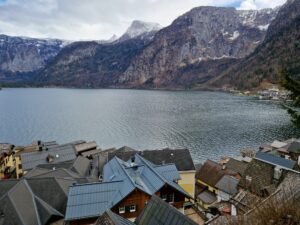
© Ralph Rauhut
rge of explaining to me how everything worked in the company. I had a lot of freedom to choose which projects and with who I wanted to work. Everyone at the company was friendly to me, and I never felt being treated differently for being “just” an intern. I had to assume a lot of responsibility, but I was also awarded the respective recognition. The company also offered a lot of benefits, like discounts on different store
s and cheap meals (3 EUR for a 4 course menu). During my internship I learned a lot and made some important connections that might help me in my future career. There were also many other interns with whom I became friends with and continue to stay in touch after the internship ended.
During the weekends I was always on the go. When I arrived to Austria I purchased the “Klimaticket Ö” which allows you to take any train or bus you want in the whole country. During the warmest months here, namely October and November, I often went hiking with friends or exploring different cities like Hallstatt, Innsbruck or Vienna. During the other months I was mostly skiing in different ski resorts around Salzburg. To go partying, if après-ski is not your thing, I would recommend going to Vienna, but Salzburg also has some decent clubs.
In the end I can say that I really enjoyed my time here in Hallein and at Bosch. The people I met in Austria were very kind and made me always feel welcome. Even though I really liked Hallein and Salzburg, I prefer bigger cities to live for a longer period. That’s why I am aiming towards getting a job in Vienna at Bosch once I finish my master’s degree. I will, however, definitely come back to Hallein to visit the friends I made during my stay and to go skiing with them on the nearby mountains.
Experience Report on my Erasmus+ Traineeship at Bentley Motors in Quality Planning in Crewe, UK
- Business Administration and Engineering: Mechanical Engineering M.Sc.
- United Kingdom, Crewe
- Bentley Motors Ltd
- 08/2022 – 03/2023
I. Setup and visa
Where to begin…
This was probably the most nerve-wracking part of the entire Erasmus experience. I had my job interview in January 2022 while I was still on my internship with Porsche. During the interview I asked my interviewer and my future line-manager: “Well I really appreciate the chance to interview for the position, but do you know how we will deal with the visa requirements for the role?” to which he replied “If we decide to go with you as a candidate I will offer you all the support I can and if there is a will there is always a way”. Reason for asking this was obviously the Brexit which means that for all academic and job purposes a visa is required.
At the time of writing this there were two main visa routes to do an internship in the UK: The “GAE” visa and the “Skilled Worker Visa”. Unfortunately due to the high cost associated the latter was not an option. The Erasmus Programme generation until 2021 was a government approved exchange scheme eligible for a “GAE” visa which meant this was the only visa route I was able to take. This is why my internship was carried out as an Erasmus Placement. The subsequent Erasmus program generation is not eligible for this visa unfortunately.
You may think now “but why can you be an Erasmus student from the 2021 generation in 2023?”. The reason for that was that which generation you belong to is dependent on where the funding of the scholarship comes from. So the RWTH provided me the scholarship for an Erasmus Exchange from the budget of the 2021 program generation so I could actually get a UK visa for my placement. This method unfortunately ends working in May 2023 which is the end of the grace period given by the UK government.
For everybody trying to undertake an internship in the UK I heavily suggest getting in touch with the international office to explore options that are right for you. There is a list of government authorized exchange schemes for the UK on the gov.uk website. When you are in touch with a company you want to intern with, check if they have a contract in place with a company such as “Tier5Intern” or “ASGVisa” who offer authorized exchange schemes for foreign students. Plan at least 4 months (ideally 6) to deal with all the paperwork, errands and research required to make it happen.
It is a difficult path to be honest, but my line-manager was right with what he said to me during the interview. Best advice I can give on this matter is to stay persistent and encourage on-going communication between the international office, your company’s HR department, yourself and your manager.
II. Bentley Motors and the Quality Management role
Bentley Motors is a luxury car manufacturer based in Crewe, UK, known for producing high-end cars. The company has recently embraced new technologies and has focused on expanding its product range to include SUVs and electric vehicles. Bentley’s new strategy, called Beyond100, aims to become a global leader in sustainable luxury mobility, with a goal to become a fully electric brand by 2030 and to reduce its carbon footprint by 75% over the next decade. Key competitors include other luxury car brands such as Rolls-Royce, Aston Martin, Jaguar Land Rover, and Porsche.
As already mentioned, my placement was within the Quality Planning department. For me this role helped me expand my horizons in terms of work dynamic first and foremost. Because my previous role was production oriented, I was often pre-occupied with “firefighting” and dealing with new topics that came up adhoc. In my new team at Bentley the dynamic is very different. The quality planning department is split into two main branches. The first one is managing part approval and part maturation for new vehicle projects. The second branch primarily manages quality topics in the concept stage of a new vehicle project. Thus the work was overall more about looking ahead focusing on proactive quality management. That is why the placement helped broaden my horizon not just in terms of factual knowledge but also different workplace dynamics.
My placement project revolved around (re-)defining and writing the departments project deliverables in-line with Bentley’s new vehicle project management framework (in short PEP: “Product Emergence Process”). For this I held workshops with the relevant stakeholders to define who in the department is responsible for each activity within a certain process and then defining that process on a high level. This may sound tedious on the surface, but it was quite important since the department is measured against these deliverables as a vehicle project progresses. As part of this project I was able to improve my own project management, presentation and influencing skills.
Alongside this project I was also able to spend time in both sub departments because I made point to learn about the PEP-deliverables before attempting to define them. Thus I took part in various competitor benchmarking events, vehicle design assessments, went on supplier visits, took part in ergonomic studies, conducted maturity level assessments and of course, also spent some time with the product. In addition I got to learn about other functions such as our internal laboratory, production, product audit and the sourcing process in general.
One thing that stuck out to me is the difference in working culture between the UK and Germany. In my previous internship I found the company hierarchy to be quite steep for example. At Bentley the hierarchies are relatively flat compared to other Volkswagen group companies from what I can tell. I have also found that your formal education or position has a smaller impact on the way people treat you. In general people seem to give you responsibility and tasks purely based on your own ability which I find very positive. A lot of the people I got to meet had more varied work experiences compared to what I knew in Germany. Some of them have been in the military and then worked on the line before becoming quality engineers for example. Also there is a very large focus on upskilling in the job. So a lot of people I met worked their way into the position they are in organically, whereas in Germany people in similar roles all have B.Sc.’s and M.Sc.’s.
One thing I also quite enjoy is the “banter”. In Germany most people are very straight to the point and often quite serious. Contrary in England people tend “dance around” certain topics especially if they have a request. For example it is quite customary to have a short chat before getting to the actual point. Also people are more open to make a joke here and there to lighten the mood even at work (within reason). At first, I had to get used to these things a bit, but I find it makes day to day work much more enjoyable.
III. Experience in Crewe, UK
Bentley Motors is based in Crewe which is in Cheshire. I choose to live in Crewe during my placement year because I wanted to make sure I am close to my place of work. The reason being that even though Bentley has a flexible working system, I wanted to make the most of my time and be in the office as much as possible.
Crewe has both its good and bad aspects. I don’t want to sugarcoat it: there are probably more bad aspects than good. While it has a rich industrial history, the town has struggled with economic decline in recent years. As a result, the town may not be considered the nicest place to live by some. That said, living in Crewe is affordable, and it offers access to transportation links, making it a good base for exploring other parts of the UK and getting away from Crewe. For example it is easy to get to metropolitan areas such as Manchester, Liverpool, and London. If you are more in the countryside, it is also possible to get to Wales and various national parks such as the peak district from Crewe. Also most of the other industrial placement students lived in Crewe as well which meant it was good for my social life to not live in a prettier city nearby (for example Nantwich).
IV. Conclusion
Even though the process of getting the visa was cumbersome, the experience during the placement made it all the more worth to go through the effort. I got to meet a lot of interesting people both on and off the job from which I learnt a lot. Also I found that I quite like living in Britain in general and enjoy the culture.
In fact I enjoyed it so much I applied for a permanent position in the department I had my placement in. So with the end of my placement I started a new position in the role of “Senior Engineer – Product Quality” and ended up not returning to Germany to do my M.Sc. at the RWTH.
If that doesn’t speak volumes about how much I can recommend to anyone to undertake a similar work experience, then I don’t know what does.
V. Recommendations
In the last part of this report I would like to give some useful tips to anybody moving to the UK.
- To get paid you need a UK bank account: For this I can recommend “Wise” since you can open an account while you are still in Germany.
- For finding accommodation I can recommend the platform “SpareRoom” (for house shares) as well as Zoopla and Rightmove
- If you move into a house share a lot of them are “HMO’s”. This means they are not managed by a private group of people but a company. Thus don’t be surprised if you don’t get to meet your roommates before moving in. I recommend getting a property with a low minimum tenancy length so you can move relatively soon if you don’t like your accommodation or meet other people you would rather live with.
- Make sure to get a UK phone number as soon as possible. It will make your life much easier down the line. For a monthly contract I can recommend Smarty as a provider. Overall mobile contracts are much better and cheaper than in Germany.
- If you company offers a pension scheme, get on it asap and keep the related documents in a safe place. In essence this is the company giving you free money to invest for your retirement. All the returns from this are tax-free for life. Over the course of your placement this could add up to well over a thousand dollars from which you only invested a few hundred pounds of your own money.
Highly recommendable internship in Liechtenstein
- Business Administration and Engineering: Mechanical Engineering M.Sc.
- Liechtenstein, Schaan
- Hilti AG
- 10/2022 – 03/2023
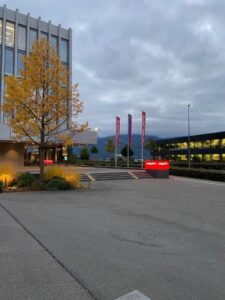
© Phil Brune
Hilti AG is a multinational company that specializes in manufacturing and supplying construction tools, systems, and services. It is committed to sustainability and social responsibility and is known for its high-quality products and innovation in the industry.
Preparation:
After I received my acceptance for the internship in Liechtenstein, I immediately started looking for an apartment. Immediately it became clear that it is not allowed to live in the country itself. So, you must decide whether you want to live in Switzerland or in Austria near the border to Liechtenstein. Clear recommendation: Feldkirch in Austria. Pretty much all interns live there, and it is a very nice old town.
Unfortunately, I was quite unlucky with my first apartment. One of my roommates was very unpleasant. That’s why my advice is to find out exactly where you’re moving to and which landlord you have. Without naming names, I can advise against a few.
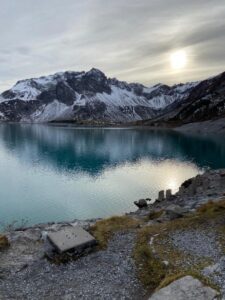
© Phil Brune
Daily life/Going out:
Before I moved to Feldkirch, I was worried that due to the size of the city (approx. 30,000 inhabitants) there would hardly be anything going on at the weekend. This fear was to prove unjustified very quickly. Feldkirch is a very lively and up-and-coming city. The high percentage of young people and the many bars and dance clubs made me feel at home right away.
Every Thursday, Hilti organizes an “Interns Dinner” for 30 interns in different restaurants. This way you meet new people every week and can expand your international network and make new friends. So you have a direct connection when you start new at Hilti.
Due to Feldkirch’s perfect location, in my opinion, there is plenty to do on the weekends, both in summer and winter. Especially if you’re into outdoor activities, you’ll love it. From hiking and biking to skiing and sledding, there is something for everyone. It’s a stone’s throw to Switzerland and Italy isn’t far either. Together with a few interns, we were in Bern, Zurich, Innsbruck, Turin and Milan, for example.
Work at Hilti AG:
Hilti has its headquarters in Liechtenstein. Both the first production facility (Plant 1) and some business units are located there. The working environment is
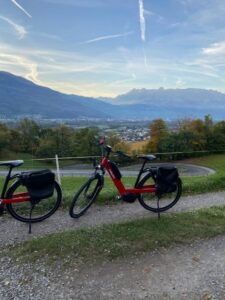
© Phil Brune
very international. I was able to expand my network a lot during the internship. There are about 80 interns working there, all of whom come from all over the world. For example, I was able to improve my English a lot.
Overall, the working atmosphere at Hilti is very pleasant and I can highly recommend the company. And the pay is excellent, by the way.
All in all I can highly recommend to do an internship there.
Internship at Harvard Medical School
- Medical PhD
- USA, Boston
- Harvard Medical School
- 11/2022 – 11/2023
- Application/Finding an internship
Applying to Harvard Medical School seemed daunting at first. The reality was far more ordinary than expected. I sent an email including CV, letter of recommendation and lette
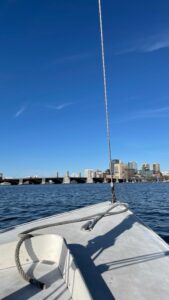
© Nikolai Ratajczak
r of motivation to the professor I wanted to work with in reply to an ad posted in the forum of my scholarship program. Within a week I had talked to two of the present lab members and the professor and was offered a position. This experience highly encouraged me to not be held back by the mystified prestige that has grown around some institutions. As my PI likes to say, in the end “we only cook with water”.
- Accomodation & Living expenses
Life in Boston and Cambridge is full of opportunities. Unfortunately living expenses and housing prices are extraordinarily high. Any room around $1000 a month will be considered cheap. In comparison to housing in Aachen this really requires a change of mind. Luckily, the college structure offers plenty of free food events to learn, participate and get some nice food. Other than that, food prices are two to three times as high as in Germany.
- Everyday life/the internship
I used to be in basic science in Aachen before coming here and was overwhelmed by the different workplace culture: I arrived just before the deadline for one of the conferences the lab attended this year and the work intensity, flow and energy reminded me rather of what I imagine a stock market to be like than what I associate with research. Overall, the team is very supportive and projects are being pushed in a demanding but productive way. Being here is definitely a great learning opportunity and can be a gateway to a career in clinical research. Other than that the city and colleges offer just about anything a student could ask for. I got into sailing and running and joined conferences every now and then.
- Free time/tips
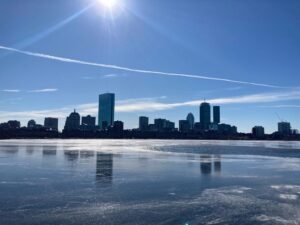
© Nikolai Ratajczak
I really enjoyed my time with the cambridge running club and the community boating incorporation. Also the museums are a must see (MFA, Harvard Arts Museum, MIT Museum, …). Most of them offer free entry at some point or another. Moreover, I love to get out of the city every now and then. Going to New Hampshire, Maine, or Rhode Island for a weekend can offer nice hikes, the experience of a less “European” US and time to bond with new friends.
- Conclusion
I highly recommend anyone to come here. Working with my PI was a great experience.

